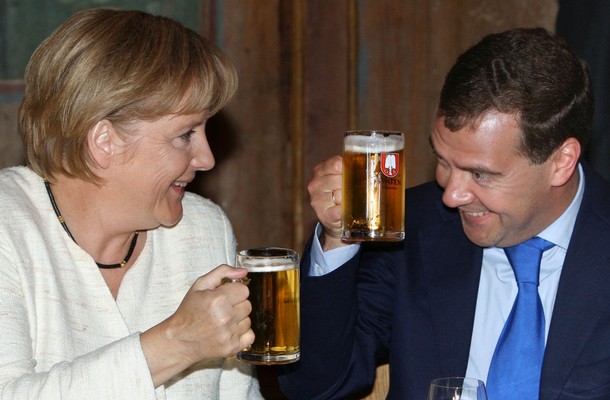
Medvedev Tries Hard but Achieves Little in Foreign Affairs
Publication: Eurasia Daily Monitor Volume: 6 Issue: 138
By:

Since the meeting with U.S. President Barack Obama in Moscow two weeks ago, President Dmitry Medvedev has been involved in a flurry of external activities from the G8 summit in L’Aquila, Italy to the informal gathering of several neighboring presidents at the traditional horse races in Moscow last weekend. One event of particular importance in this pre-holiday rush was the working visit to Munich and talks with the German Chancellor Angela Merkel, which focused mostly on overcoming the recession (Rossiyskaya Gazeta, July 17). Another event that related to a different crisis was a short visit to Tskhinvali, South Ossetia where Medvedev expressed gratitude for the opportunity to visit a "new state," inevitably triggering protests from Georgia (Vremya Novostei, July 14; Nezavisimaya Gazeta, July 17). Despite all the usual spin, the general impression from this effort to demonstrate presidential leadership in setting the course for foreign policy was rather disappointing, as if Medvedev is going through the motions without any clear sense of purpose.
One source of such an impression was the second turnaround in the decision-making on accession to the World Trade Organization (WTO), which had been dragging on for 15 years until Prime Minister Vladimir Putin announced on June 9 that Russia would start negotiations anew aimed at joining together with Belarus and Kazakhstan in one custom union (www.newsru.com, July 17). That sudden withdrawal from an almost completed process astounded many experts, not to mention entrepreneurs, but then Medvedev – after an unconvincing performance at the G8 summit – surprised everyone even more with the statement that Russia will return to the abandoned talks (Kommersant, July 11; Vedomosti, July 14). Some commentators saw in that second thought a direct conflict between Putin and Medvedev, but a more plausible explanation is the lack of any clear idea in the government on whether the sinking Russian economy needs more state protection or more openness in order to find the "bottom" of the breathtaking decline. In the break between horse races, Medvedev tried to explain to Kazakhstan’s mightily irritated President Nursultan Nazarbayev the rationale behind Russia’s maneuvering (RIA-Novosti, July 18).
Another area where Medvedev tried to build on the momentum achieved at the meeting with Obama was in strategic deterrence, so several missile tests were conducted last week, but the one that really mattered – that of the new Bulava missile for a new generation of submarines – registered yet another disappointing failure. This project is definitely flawed but the top brass advanced a different explanation – sabotage (www.gazeta.ru, www.grani.ru, July 17). Seeking to downplay this setback Medvedev visited the airborne troops’ base at Novorossiysk and inspected the Black Sea Fleet flagship cruiser Moskva (Kommersant, July 15). He was generous with compliments about the recent exercises "Caucasus-2009" and did not mention problems with implementing military reform, which is impeded by the lack of funding and has brought discontent to the officer corps.
Similar denials are typical for Medvedev’s policy in the Caucasus where he prefers not to see the growth of malignant instability in Dagestan and Ingushetia. The murder of the courageous human rights activist Natalya Estemirova in Grozny last week proved that the Kremlin has no control over the lawless Chechnya governed by the maverick Ramzan Kadyrov, but Medvedev responded by issuing the usual promises to investigate and punish the "terrorists." It was only a minor embarrassment for him to answer questions about Kadyrov’s treatment of any opposition, and he knows perfectly well that nothing can be done to restrain this mini-tyrant (Novaya Gazeta, July 17). Pretending that the North Caucasus is quiet except for some isolated incidents, Medvedev also tries to show initiative in resolving the deadlocked Karabakh conflict. It turned out, however, that he had no fresh ideas to offer to the presidents of Armenia and Azerbaijan at the meeting in Moscow and merely informed them about the discussions at the G8 summit (www.gazeta.ru, July 17).
Apparently, the presidents of the post-Soviet states have figured out the underlying weakness in Medvedev’s fidgety (rather than active) foreign policy, and that is why so few of them have shown up for the gathering in Moscow (Nezavisimaya Gazeta, July 17). He is certainly adept in court intrigues and understands the value of PR, but he has no guts for tough decisions – and that is an inexcusable flaw in this very particular company. Medvedev’s Western counterparts may be more impressed with his politeness and grasp of the internet-age issues, but his inability to cultivate real bonds with Merkel or any foreign leader testifies to a lack of character that cannot be compensated by social skills. Obama tried to boost his authority by giving him much time and every opportunity to make a difference, and the "reset" was not useless in terms of reducing bilateral tensions – but still rather disappointing in securing Russian cooperation in dealing with urgent problems from Iran to climate.
One person who has been perfectly aware of Medvedev’s flaws from the start is exactly the one who promoted him to the position where character is everything. Putin definitely has guts to spare, but that does not make him an efficient head of cabinet that has to manage a devastating crisis, because demonstrating decisiveness is useless in the absence of any idea on how to restart the economy. Putin has kept an uncharacteristically low profile in foreign policy matters in the last couple of weeks, quite possibly contemplating a response to Obama’s clearly expressed preference to deal with him as little as necessary. In a different situation, he could have waited for an opportune moment to get even, but now the solid rock of the bureaucratic pyramid under his feet is turning into shifting sands. The inter-governmental agreement on constructing the Nabucco gas pipeline signed in Ankara on July 13 is for Putin an even greater personal insult than Obama’s remark about him having one foot in the past (Ezhednevny Zhurnal, July 16). The pressure to do something in order to restore the integrity of eroding domestic control and to pay back for the foreign policy setbacks is building, and Putin has rarely performed well under pressure.




